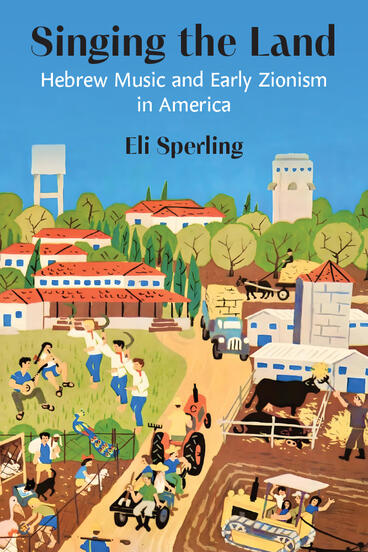Singing the Land
Hebrew Music and Early Zionism in America
How song shaped American Zionism
Description
Singing the Land: Hebrew Music and Early Zionism in America examines the proliferation and use of popular Hebrew Zionist music amongst American Jewry during the first half of the twentieth century. This music—one part in a greater process of instilling diasporic Zionism in American Jewish communities—represents an early and underexplored means of fostering mainstream American Jewish engagement with the Jewish state and Hebrew national culture as they emerged after Israel declared its independence in 1948. This evolutionary process brought Zionism from being an often-polemical notion in American Judaism at the turn of the twentieth century to a mainstream component of American Jewish life by 1948. Hebrew music ultimately emerged as an important means through which many American Jews physically participated in or ‘performed’ aspects of Zionism and Hebrew national culture from afar.
Exploring the history, events, contexts, and tensions that comprised what may be termed the ‘Zionization’ of American Jewry during the first half of the twentieth century, Eli Sperling analyzes primary sources within the historical contexts of Zionist national development and American Jewish life. Singing the Land offers insights into how and why musical frameworks were central to catalyzing American Jewry’s support of the Zionist cause by the 1940s, parallel to firm commitments to their American locale and national identities. The proliferation of this widespread American Jewish-Zionist embrace was achieved through a variety of educational, religious, economic, and political efforts, and Hebrew music was a thread consistent among them all.
Eli Sperling is an Israel Institute Teaching Fellow in the Department of International Affairs at the University of Georgia.
Reviews
"This book, concerning the role of songs in shaping Zionist affinities among American Ashkenazi Jews during the twentieth century, presents astounding archival details that are woven together in a historical narrative making for an edifying and enjoyable read. Sperling demonstrates a fantastic handling of the evolution of individual mindsets and broader ideological discourse of American Jews regarding Palestine."
– Michael Figueroa, The University of North Carolina at Chapel Hill
- Michael Figueroa
"Singing the Land introduces an important new way to consider the means through which Zionism, Hebrew language, and Hebrew culture became vital components of American Jewish identity in the 20th century. While many histories of American Jews see the interwar period as a time of relative weakness for Zionism in the United States, one of this book's major contributions is that it suggests that, at least at a cultural level, support for Zionism was steadier and more wide-spread among different segments of the American Jewish public during this period than is usually appreciated."
– Jessica Cooperman, Muhlenberg College
- Jessica Cooperman

